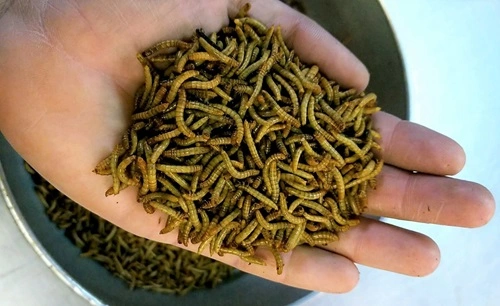Yes, in certain circumstances and locations, it is illegal to feed chickens mealworms, particularly in commercial settings or regulated environments. The primary reason for this restriction is food safety, as mealworms may pose risks of contamination, disease transmission, or unintended consequences for poultry health and the safety of eggs and meat consumed by humans.
Understanding the Ban on Feeding Mealworms to Chickens
1. Risk of Disease Transmission
- Mealworms, whether live, dried, or processed, can carry pathogens such as salmonella, E. coli, or avian diseases if they are not sourced from regulated, safe environments.
- Feeding contaminated mealworms to chickens can lead to disease outbreaks that may compromise the health of the flock and humans consuming chicken products.
2. Unregulated Mealworm Production
- Mealworms sold as pet food or bait are not always produced under the strict safety and quality regulations required for poultry feed. Using these mealworms for chickens may introduce harmful substances into the food chain.
3. Regulatory Oversight
- In the United States, the Food and Drug Administration (FDA) and the USDA regulate animal feed ingredients to ensure safety for both animals and humans. Feeding chickens mealworms not approved for poultry use may violate these guidelines.
- The European Union also prohibits the use of animal protein, including insects like mealworms, in poultry feed as part of its ban on feeding animal byproducts to livestock.
4. Food Safety for Human Consumption
- Chickens fed unsafe or contaminated mealworms could produce eggs or meat that contain harmful pathogens or toxins, posing risks to consumers.
Legal Restrictions on Feeding Mealworms to Chickens
1. Commercial Farming Regulations
- Commercial poultry farms are subject to strict feeding guidelines to ensure the safety of food products. Feeding mealworms, particularly unregulated ones, is typically prohibited in these settings.
2. Backyard Chickens
- For backyard chicken owners, there may not be explicit laws banning mealworms, but the risks of disease and contamination remain. States and local jurisdictions may impose additional restrictions.
3. International Laws
- In countries like the UK and across the EU, feeding mealworms to chickens is banned under animal byproduct regulations designed to prevent diseases such as mad cow disease and similar outbreaks.
Risks of Feeding Mealworms to Chickens
1. Pathogen Contamination
- If mealworms are raised or stored in unsanitary conditions, they can harbor bacteria or viruses that can infect chickens or humans through eggs and meat.
2. Unbalanced Nutrition
- Mealworms are high in protein but lack the balanced nutrients chickens need for optimal health. Over-reliance on mealworms can lead to nutritional deficiencies or imbalances.
3. Introduction of Toxins
- Mealworms may accumulate harmful substances like pesticides or heavy metals if raised in contaminated environments, which can then transfer to chickens and humans.
Legal Alternatives to Mealworms
1. Commercial Poultry Feeds: Stick to USDA-approved chicken feeds, which provide balanced nutrition and are regulated for safety.
2. Natural Protein Sources: Offer chickens other safe protein sources, such as black soldier fly larvae, which are specifically approved for use in poultry feed in some jurisdictions.
3. Insects Approved for Feed: Some insect-based feeds are commercially produced and regulated for poultry use, offering a safe alternative to mealworms.
Best Practices for Backyard Chicken Owners
1. Check Local Regulations: Research your state and local laws regarding what can be fed to backyard chickens to ensure compliance.
2. Buy from Trusted Sources: If you choose to feed mealworms, purchase them from sources that guarantee they are safe for poultry consumption and free of contaminants.
3. Provide a Balanced Diet: Ensure your chickens receive a diet that meets their nutritional needs, including grains, vegetables, and approved protein sources.
Related FAQs
Q1. Is it illegal to feed mealworms to chickens in the U.S.?
Ans: It depends. Feeding mealworms to chickens is prohibited in commercial poultry settings if the mealworms are unregulated or not approved for poultry feed. Backyard chicken owners may not face explicit bans but should proceed with caution.
Q2. Can I feed chickens mealworms meant for pets?
Ans: No, pet-grade mealworms are not regulated for poultry use and may carry pathogens or contaminants harmful to chickens and humans.
Q3. Are black soldier fly larvae safer than mealworms?
Ans: Yes, black soldier fly larvae are often approved for use in poultry feed and are produced under regulated conditions, making them a safer protein source.
Q4. Why do some countries ban feeding mealworms to chickens?
Ans: Countries like the UK and EU nations prohibit feeding mealworms to chickens to prevent disease transmission and maintain food safety standards for meat and eggs.
Q5. What are the penalties for feeding chickens mealworms in commercial farming?
Ans: Violations of feeding regulations in commercial settings can result in fines, loss of certifications, or other penalties depending on state and federal laws.
Conclusion
Feeding chickens mealworms is prohibited in many regulated environments due to the risks of disease transmission, contamination, and food safety concerns. While backyard chicken owners may not always face explicit bans, it is essential to source mealworms from safe, regulated suppliers and prioritize approved feeding practices to protect both chickens and consumers. Always consult local laws and regulations to ensure compliance and the health of your flock.

